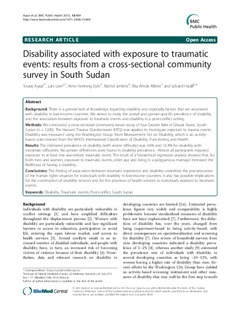| dc.contributor.author | Ayazi, Touraj | |
| dc.contributor.author | Lien, Lars | |
| dc.contributor.author | Eide, Arne | |
| dc.contributor.author | Jenkins, Rachel | |
| dc.contributor.author | Albino, Rita A. | |
| dc.contributor.author | Hauff, Edvard | |
| dc.date.accessioned | 2014-01-24T08:03:30Z | |
| dc.date.available | 2014-01-24T08:03:30Z | |
| dc.date.issued | 2013 | |
| dc.identifier.citation | Ayazi, T., Lien, L., Eide, A., Jenkins, R., Albino, R.A., Hauff, E. (2013). Disability associated with exposure to traumatic events: results from a cross-sectional community survey in South Sudan. BMC Public Health, 13(469). | no_NO |
| dc.identifier.uri | http://hdl.handle.net/11250/134644 | |
| dc.description | Vitenskapelig, fagfellevurdert artikkel | no_NO |
| dc.description.abstract | Background: There is a general lack of knowledge regarding disability and especially factors that are associated
with disability in low-income countries. We aimed to study the overall and gender-specific prevalence of disability,
and the association between exposure to traumatic events and disability in a post-conflict setting.
Methods: We conducted a cross-sectional community based study of four Greater Bahr el Ghazal States, South
Sudan (n = 1200). The Harvard Trauma Questionnaire (HTQ) was applied to investigate exposure to trauma events.
Disability was measured using the Washington Group Short Measurement Set on Disability, which is an activitybased
scale derived from the WHO’s International Classification of Disability, Functioning and Health.
Results: The estimated prevalence of disability (with severe difficulty) was 3.6% and 13.4% for disability with
moderate difficulties. No gender differences were found in disability prevalence. Almost all participants reported
exposure to at least one war-related traumatic event. The result of a hierarchical regression analysis showed that, for
both men and women, exposure to traumatic events, older age and living in a polygamous marriage increased the
likelihood of having a disability.
Conclusions: The finding of association between traumatic experience and disability underlines the precariousness
of the human rights situation for individuals with disability in low-income countries. It also has possible implications
for the construction of disability services and for the provision of health services to individuals exposed to traumatic
events. | no_NO |
| dc.language.iso | eng | no_NO |
| dc.publisher | BioMed Central | no_NO |
| dc.relation.uri | http://biomedcentral.com | |
| dc.relation.uri | http://www.biomedcentral.com/1471-2458/13/469 | |
| dc.subject | disability | no_NO |
| dc.subject | traumatic events | no_NO |
| dc.subject | post-conflict | no_NO |
| dc.subject | South-Sudan | no_NO |
| dc.title | Disability associated with exposure to traumatic events: results from a cross-sectional community survey in South Sudan | no_NO |
| dc.type | Journal article | no_NO |
| dc.type | Peer reviewed | no_NO |
| dc.subject.nsi | VDP::Medical disciplines: 700::Health sciences: 800 | no_NO |
| dc.subject.nsi | VDP::Medical disciplines: 700::Clinical medical disciplines: 750 | no_NO |
| dc.source.volume | 13 | no_NO |
| dc.source.journal | BMC Public Health | no_NO |
| dc.source.issue | 1 | no_NO |
| dc.identifier.doi | http://dx.doi.org/10.1186/1471-2458-13-469 | |
